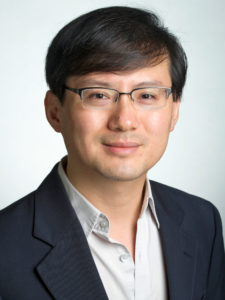Networking for Big Data: Theory, Algorithms and Applications
Edmund Yeh, Professor of Electrical and Computer Engineering at Northeastern University
 Abstract: In the era of big data, experts in various fields are facing unprecedented challenges in data access, distribution, processing and analysis, and in the coordinated use of limited computing, storage and network resources. To address this, we present new frameworks for the optimization of key network functionalities, which are broadly applicable to content delivery networks, wireless heterogeneous networks, and distributed computing networks. The frameworks enable joint (in-network) caching, request routing, and congestion control for content distribution over general network topologies, optimizing metrics including routing costs, data retrieval delay, and content-based fairness. We meet the challenge of the underlying NP-hard problems by exploiting submodularity, matroid structure, DR-submodularity, and by leveraging tools including concave relaxation, stochastic gradient ascent, continuous greedy and Lagrangian barrier algorithms. We develop polynomial-time approximation algorithms with proven optimality guarantees, with particular emphasis on adaptive and distributed implementations.
Abstract: In the era of big data, experts in various fields are facing unprecedented challenges in data access, distribution, processing and analysis, and in the coordinated use of limited computing, storage and network resources. To address this, we present new frameworks for the optimization of key network functionalities, which are broadly applicable to content delivery networks, wireless heterogeneous networks, and distributed computing networks. The frameworks enable joint (in-network) caching, request routing, and congestion control for content distribution over general network topologies, optimizing metrics including routing costs, data retrieval delay, and content-based fairness. We meet the challenge of the underlying NP-hard problems by exploiting submodularity, matroid structure, DR-submodularity, and by leveraging tools including concave relaxation, stochastic gradient ascent, continuous greedy and Lagrangian barrier algorithms. We develop polynomial-time approximation algorithms with proven optimality guarantees, with particular emphasis on adaptive and distributed implementations.
We further discuss the extension of these frameworks for jointly optimal wireless user association and content caching in wireless heterogeneous networks, and for jointly optimal computation scheduling, caching and request forwarding in distributed computing networks. Finally, we discuss an ongoing project which applies the optimization frameworks and algorithms to facilitate data distribution and computation in the Large Hadron Collider (LHC) high-energy physics network, one of the largest data applications in the world.
Biography: Edmund Yeh received his B.S. in Electrical Engineering with Distinction and Phi Beta Kappa from Stanford University in 1994. He then studied at Cambridge University on the Winston Churchill Scholarship, obtaining his M.Phil in Engineering in 1995. He received his Ph.D. in Electrical Engineering and Computer Science from MIT under Professor Robert Gallager in 2001. He is a Professor of Electrical and Computer Engineering at Northeastern University with a courtesy appointment in Khoury School of Computer Sciences. He was previously Assistant and Associate Professor of Electrical Engineering, Computer Science, and Statistics at Yale University.
Professor Yeh is an IEEE Communications Society Distinguished Lecturer. He serves as the inaugural Area Editor for Networking and Computation for IEEE Transactions on Information Theory. He has received three Best Paper Awards, including awards at the 2017 ACM Conference on Information-Centric Networking (ICN), and at the 2015 IEEE International Conference on Communications (ICC) Communication Theory Symposium. Professor Yeh is the recipient of the Alexander von Humboldt Research Fellowship, the Army Research Office Young Investigator Award, the Winston Churchill Scholarship, the National Science Foundation and Office of Naval Research Graduate Fellowships, the Barry M. Goldwater Scholarship, the Frederick Emmons Terman Engineering Scholastic Award, and Stanford University President’s Award for Academic Excellence. Professor Yeh served as TPC Co-Chair for ACM MobiHoc 2021 and as General Chair for ACM SIGMETRICS 2020. He has served as both Treasurer and Secretary of the Board of Governors of the IEEE Information Theory Society, as well as Associate Editor for IEEE Transactions on Networking, IEEE Transactions on Mobile Computing, and IEEE Transactions on Network Science and Engineering.
On Open RAN Telco Analytics and Automation
Rittwik Jana, Principal Wireless Network Engineer at Google
 Abstract: Open RAN has gained significant momentum in the last five years. We discuss some of the challenges and opportunities that Open RAN faces followed by some of the architecture and deployment scenarios that are popular. We also provide an overview of some interesting AI/ML enabled use cases that benefit from open interfaces driving massive closed loop automation and secure distributed intelligence in a multi-cloud architecture. The talk will be more of a tutorial nature and target an audience who is interested in learning about the next generation cellular network and future research problems.
Abstract: Open RAN has gained significant momentum in the last five years. We discuss some of the challenges and opportunities that Open RAN faces followed by some of the architecture and deployment scenarios that are popular. We also provide an overview of some interesting AI/ML enabled use cases that benefit from open interfaces driving massive closed loop automation and secure distributed intelligence in a multi-cloud architecture. The talk will be more of a tutorial nature and target an audience who is interested in learning about the next generation cellular network and future research problems.
Biography: Rittwik is currently a Telco analytics and automation network engineer at Google. He was previously the chief architect of RAN intelligence at VMware and a Director/MTS of inventive science at AT&T Shannon Research Labs. He is an industry expert with over 25 years of experience in numerous wireless technologies and standards. His interests span architecting the disaggregated RAN intelligent controllers in O-RAN, service composition of VNFs using TOSCA, model driven control loop and automation in ONAP, networked video streaming and cellular networks and systems. He is the co-chair of the requirements group in Open RAN Software Community (OSC) and was also the chair of WG5 in FCC’s Communications Security, Reliability, and Interoperability Council. He earned a Ph.D. in Telecommunications Engineering from the Australian National University, Canberra, Australia in 2000.


